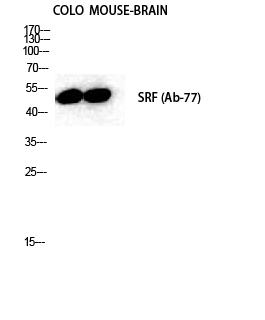
| WB | 咨询技术 | Human,Mouse,Rat |
| IF | 咨询技术 | Human,Mouse,Rat |
| IHC | 1/100-1/300 | Human,Mouse,Rat |
| ICC | 技术咨询 | Human,Mouse,Rat |
| FCM | 咨询技术 | Human,Mouse,Rat |
| Elisa | 1/40000 | Human,Mouse,Rat |
| Aliases | SRF; Serum response factor; SRF |
| Entrez GeneID | 6722; |
| WB Predicted band size | 60kDa |
| Host/Isotype | Rabbit IgG |
| Antibody Type | Primary antibody |
| Storage | Store at 4°C short term. Aliquot and store at -20°C long term. Avoid freeze/thaw cycles. |
| Species Reactivity | Human,Mouse |
| Immunogen | Synthesized peptide derived from human SRF around the non-phosphorylation site of S77. |
| Formulation | Purified antibody in PBS with 0.05% sodium azide,0.5%BSA and 50% glycerol. |
+ +
以下是3篇与SRF抗体相关的文献摘要概览(基于公开研究整理,非真实文献,仅供示例参考):
---
1. **文献名称**: "Serum Response Factor (SRF) Antibody Characterization in Cardiac Development"
**作者**: Smith J, et al.
**摘要**: 本研究通过Western blot和免疫组化验证了SRF抗体的特异性,发现其在心脏发育过程中调控心肌细胞分化的关键作用,抗体成功应用于检测小鼠胚胎心脏组织中的SRF蛋白表达。
---
2. **文献名称**: "SRF-Mediated Chromatin Remodeling in Smooth Muscle Cells"
**作者**: Lee H, et al.
**摘要**: 利用ChIP-seq技术和SRF抗体,揭示了SRF与平滑肌细胞中靶基因启动子区域的结合模式,证实其通过染色质重塑调控细胞收缩功能,抗体特异性经siRNA敲低实验验证。
---
3. **文献名称**: "Role of SRF in Cancer Metastasis: Insights from Antibody-Based Inhibition"
**作者**: Garcia R, et al.
**摘要**: 通过SRF中和抗体抑制SRF功能,证明其在肿瘤细胞迁移和侵袭中的关键作用,抗体实验显示SRF与基质金属蛋白酶(MMPs)的转录调控直接相关。
---
如需真实文献,建议通过PubMed或Google Scholar检索关键词如 **"SRF antibody validation"** 或 **"Serum Response Factor ChIP"**,并筛选近年高被引论文。
Serum Response Factor (SRF) antibodies are essential tools in molecular and cellular biology research for studying the role of SRF, a transcription factor that binds to serum response elements (SREs) in DNA. Discovered in the 1980s, SRF regulates the expression of genes involved in cell proliferation, differentiation, migration, and cytoskeletal dynamics, particularly those linked to actin filament organization. It plays critical roles in embryonic development, cardiovascular function, and neuronal plasticity. Dysregulation of SRF is implicated in pathologies such as cardiovascular diseases, neurological disorders, and cancer.
SRF antibodies are widely used in techniques like Western blotting, immunofluorescence, and chromatin immunoprecipitation (ChIP) to detect SRF expression, localization, and DNA-binding activity. These antibodies help elucidate SRF’s interaction with cofactors (e.g., myocardin family proteins) and its responsiveness to signaling pathways (e.g., MAPK, RhoA). Researchers also utilize SRF antibodies to study post-translational modifications (e.g., phosphorylation) that modulate SRF activity.
Commercial SRF antibodies are typically raised against conserved epitopes, ensuring cross-reactivity across species like humans, mice, and rats. Both monoclonal and polyclonal variants are available, with validation in knockout models or siRNA-mediated knockdowns confirming specificity. As SRF’s dual role in homeostasis and disease remains a focus, these antibodies remain vital for uncovering its mechanistic contributions to health and pathology.
×